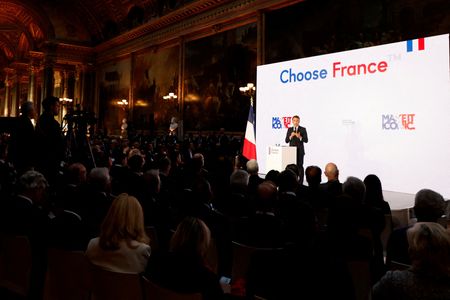By Leigh Thomas
PARIS (Reuters) – For 65 years German electrical components maker Hager has straddled the Rhine with sites on either side, but lately the family-owned group has plumped for the French side to host its expansion plans.
Cuts to French business tax rates, help from local officials ready to go out of their way to identify sites for business expansion and even new wiggle room in notoriously rigid labour rules are making France a proposition hard to turn down, group chairman Daniel Hager told Reuters.
Seven years of pro-business reforms under President Emmanuel Macron have helped rebalance economic relations between the euro zone’s two biggest economies.
Gone are the days when foreign investors would baulk at France’s high taxes and 35-hour work week, compared with Germany’s 40 hours, and France is also seeing record levels of foreign direct investment.
“Since President Macron’s been in place, the business climate is distinctly more positive and welcoming to companies,” Hager said.
While still investing in Germany, the group – a typical example of the small to midsize “Mittelstand” of often family-owned firms that account for 55% of German jobs – is ploughing 120 million euros ($130 million) into France’s border region of Alsace.
With questions growing over Germany’s economic growth model, Macron can worry less than his predecessors over whether France is at risk of being outclassed when he heads to Berlin on Sunday for the first state visit by a French president since 2000.
Back then, France had just enshrined in law a 35-hour work week – a turnoff to many foreign investors – while Germany would later double down on labour market reforms that helped usher in a decade of strong export growth from 2006.
In more recent years, German growth has sputtered due to the country’s over-dependence on exports to China and previously on cheap Russian gas while creaking infrastructure, high power prices and tight fiscal policy have also weighed.
By contrast, France’s long-term commitment to nuclear energy – with plans in place to invest at least 52 billion euros in six new reactors – is an increasing attraction for foreign tech investors like Microsoft, which aims to build power-hungry data centres there.
RECIPE FOR SUCCESS
With Germany struggling to gain momentum and Britain held back by the long fallout from Brexit, France has been Europe’s top destination for foreign direct investment since 2019, according to an annual survey consultants EY.
This year it has already won a record 15 billion euros in investment commitments at an annual “Choose France” event Macron hosts yearly at the Versailles Palace for global CEOs.
Macron has reduced companies’ annual tax bill by a combined 25 billion euros by cutting the corporate income tax rate to 25% while reducing or outright scrapping other business taxes, which Hager said Berlin could take inspiration from.
The average corporate tax rate in Germany is just below 30%, according to federal economic development agency Germany Trade & Invest.
Macron has also capped employer payouts in labour courts, invested in apprenticeships and given companies more freedom to opt out of the 35-hour work week.
The softer tax burden compounds advantages like a skilled workforce or good infrastructure that have long found favour with foreign investors in the tech sector, said Laurent Degre, France head of U.S. communications technology group Cisco.
“Compared to other competitive countries like Germany or Britain, France isn’t the most attractive in everything, but it’s got a full mix which is important when you invest,” he said.
Foreign investors also appreciate that Macron’s government has resisted opposition calls to downsize a generous tax credit for research and development that has long been a major draw for multinationals.
“We need to have stable policies and not wonder if policy is going to change every six months,” said Romain Dumas, France head of U.S. food and pet-care group Mars.
NOT ALL ROSES
The pro-business push has borne economic fruit, with French economic growth more than double that of Germany since Macron was first elected in 2017, according to Reuters calculations, while employment in France has now reached record levels.
The EY survey found that the number of jobs created by foreign investments last year rose 4% last year, despite a decline in the number of projects.
“He (Macron) doesn’t get credit for that, French politics are difficult,” EY’s EMEIA area managing partner Julie Linn Teigland told Reuters.
Though popular with foreign investors, Macron’s reforms have often rubbed voters the wrong way, leaving his ratings stuck at low levels and polls indicating his party is set to be trounced by the far right in EU parliament elections in June.
The economy also still faces numerous challenges from flagging productivity to an oversized budget deficit, which the IMF warned on Thursday would miss the government’s targets.
Meanwhile, foreign investors say that Macron still needs to do more, especially to cut red-tape on businesses, which a new bill by his Finance Minister Bruno Le Maire aims to address.
Thousands of administrative forms will be phased out, while various official websites for everything from taxes to payroll charges will be put on one unified site.
Hager said that even if foreign investment is back in a big way in France, its industrial sector still has a long way to go to catch up with Germany.
“Economically there’s no reason to be shouting from the roof tops,” he said.
($1 = 0.9229 euros)
(Reporting by Leigh Thomas; Additional reporting by Mark John and Maria Martinez; Editing by Hugh Lawson)





